 Petzlover
Petzlover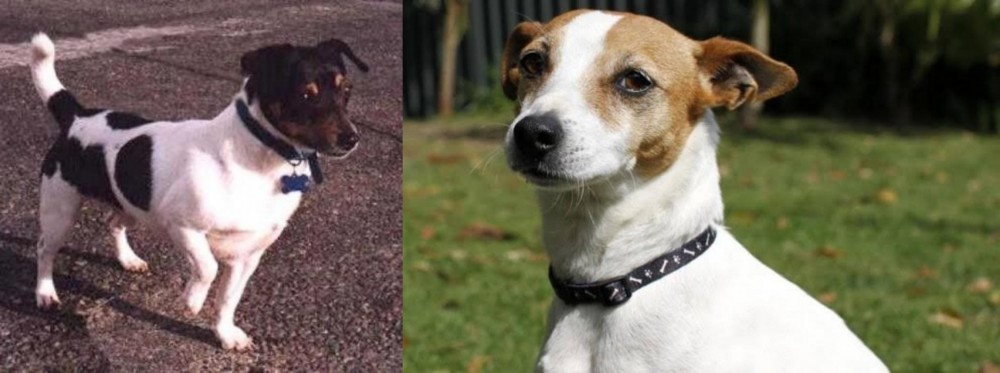 Teddy Roosevelt Terrier is originated from United States but Tenterfield Terrier is originated from Australia. Both Teddy Roosevelt Terrier and Tenterfield Terrier are having almost same height. Teddy Roosevelt Terrier may weigh 19 kg / 41 pounds lesser than Tenterfield Terrier. Both Teddy Roosevelt Terrier and Tenterfield Terrier has almost same life span. Both Teddy Roosevelt Terrier and Tenterfield Terrier has almost same litter size. Teddy Roosevelt Terrier requires Moderate Maintenance. But Tenterfield Terrier requires Low Maintenance
Teddy Roosevelt Terrier is originated from United States but Tenterfield Terrier is originated from Australia. Both Teddy Roosevelt Terrier and Tenterfield Terrier are having almost same height. Teddy Roosevelt Terrier may weigh 19 kg / 41 pounds lesser than Tenterfield Terrier. Both Teddy Roosevelt Terrier and Tenterfield Terrier has almost same life span. Both Teddy Roosevelt Terrier and Tenterfield Terrier has almost same litter size. Teddy Roosevelt Terrier requires Moderate Maintenance. But Tenterfield Terrier requires Low Maintenance
 Teddy Roosevelt Terriers (Teddy, American Teddy) are American hunting terriers related to American Rat Terriers and a host of other working, farm, hunting dogs initially brought by working-class immigrants from England and Europe. Largely due to the working nature of these dogs early the cross breeding was to reinforce useful traits like a superior ability to scent prey. It also bequeathed the breed with superior intelligence. While they take a while to warm up to new people, to their human family they like to be close all the time, and are eager to be with them and please them. Teddy's share their early history with American Rat Terriers, Fox Paulistinha, Tenterfield Terrier and Beagles. They also are related to Feist (dog), and Turnspit dogs, English White Terrier and Wry-legged terrier (all now extinct), as well as Bull, Smooth Fox, Manchester Terriers with Beagles, Italian Greyhound and Whippets in the mix.
Teddy Roosevelt Terriers (Teddy, American Teddy) are American hunting terriers related to American Rat Terriers and a host of other working, farm, hunting dogs initially brought by working-class immigrants from England and Europe. Largely due to the working nature of these dogs early the cross breeding was to reinforce useful traits like a superior ability to scent prey. It also bequeathed the breed with superior intelligence. While they take a while to warm up to new people, to their human family they like to be close all the time, and are eager to be with them and please them. Teddy's share their early history with American Rat Terriers, Fox Paulistinha, Tenterfield Terrier and Beagles. They also are related to Feist (dog), and Turnspit dogs, English White Terrier and Wry-legged terrier (all now extinct), as well as Bull, Smooth Fox, Manchester Terriers with Beagles, Italian Greyhound and Whippets in the mix.
Only since 1996 have Teddy Roosevelt Terriers had standards set for the breed. The major difference between Teddys and the related American Rat Terrier is Teddys are closer to the ground (bench-legged), have greater bone density and more muscle. Teddys are medium to small sized. It was in the mid 1990's that the effort began to breed only the shorter legged phenotype into the Teddy lineage and allow the rat Terrier to be the longer legged variety. The UKC (United Kennel Club) and AKC (American Kennel Club) both recognize Teddys, the UKC since 1999.
The Rat Terrier Club of America separated the long legged and short legged varieties, the short legged ones were named in honor of President Theodore Roosevelt. It is rather interesting that President Theodore Roosevelt, while being very fond of his family dogs did not own any Rat Terriers, and did not help develop the breed that bears his name. He mentions dogs in several of his letters, Skip who rode with the president on his horse while hunting and belonged to a friend, Scamp who lived with the Roosevelt's in the White House and hunted and caught rats and their dog Jack.
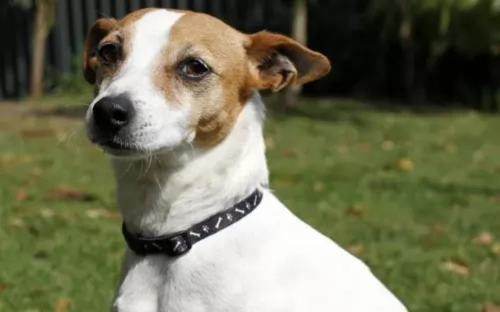 The ancestors of the Tenterfield Terrier came to Australia with the British and from them came this Australian breed. The English terriers were bred to be ratters on the ships to Australia. Today’s breed is a hardy, strong, athletic and agile dog. These first dogs were miniature Fox Terriers, bred for ratting. The miniature Fox Terrier was an established breed in the late 19th century in Australia with families and was know as a Mini Foxie. The breed became a steady presence in homes by the 1920’s.
The ancestors of the Tenterfield Terrier came to Australia with the British and from them came this Australian breed. The English terriers were bred to be ratters on the ships to Australia. Today’s breed is a hardy, strong, athletic and agile dog. These first dogs were miniature Fox Terriers, bred for ratting. The miniature Fox Terrier was an established breed in the late 19th century in Australia with families and was know as a Mini Foxie. The breed became a steady presence in homes by the 1920’s.
The breed might not have been named after the area of Tenterfield as many have guessed. Instead they may have been named after a breeder. The owner of the Tenterfield saddlery was called Tenterfield Saddler and he owned several of the breed. In 1990, Don Burke, a television personality suggested the breed be named the Tenterfield Terrier.
The Miniature Fox Terrier Club of South Australia. Now there were several clubs in Australia and a lot of disagreement about exactly what type of dog a miniature fox terrier was. Some did not think the name was legitimate, but they wanted recognition from the Australian National Kennel Club (ANKC). So, they became the Tenterfield Terrier Club of Australia in 1993. They were recognized by 2002.
Today the breed standard for the Tenterfield Terrier is different from the one for the Miniature Fox Terrier. They are now entirely separate breeds. In addition to the ANKC, the breed is recognized by the New Zealand Kennel Club but not by the AKC. It is also recognized by the American Pet Registry, Inc, the American Canine Registry and the Dog Registry of America, Inc.
 Teddy Roosevelt Terriers are hunting terriers that are short legged, well muscled and very active. They have proportionate wide, sightly rounded heads cuneus (wedge) shaped on which the V shaped ears are set on the outside edge. Their ears may be button or erect, and breed standards prefer a docked tail, but it is not necessary. Ideally Teddy's have length/height ratio is 10/7 or 10/8. The Teddy Roosevelt Terriers coats may be solid white, other colors with patches and markings. Their coats are short and rough. Because they are working dogs, what is termed as “honorable” scars from work are not deducted from the dogs points. If the dog is not proportionate to breed standards (for example long legs or square body) it may be disqualified, but exaggerations and faults are marked only is in as much as it interferes with the ability to work. They are very pleasant looking and have a lively manner.
Teddy Roosevelt Terriers are hunting terriers that are short legged, well muscled and very active. They have proportionate wide, sightly rounded heads cuneus (wedge) shaped on which the V shaped ears are set on the outside edge. Their ears may be button or erect, and breed standards prefer a docked tail, but it is not necessary. Ideally Teddy's have length/height ratio is 10/7 or 10/8. The Teddy Roosevelt Terriers coats may be solid white, other colors with patches and markings. Their coats are short and rough. Because they are working dogs, what is termed as “honorable” scars from work are not deducted from the dogs points. If the dog is not proportionate to breed standards (for example long legs or square body) it may be disqualified, but exaggerations and faults are marked only is in as much as it interferes with the ability to work. They are very pleasant looking and have a lively manner.
Teddy Roosevelt Terriers are happy when they are the constant companion of their owner(s) and will shadow their master all day. Temperamentally they love to play, do well in obedience training and are territorial and protective and are exceptional watch dogs. Of course, they were bred as hunting dogs and have hunting instincts, a greater than median prey drive and will chase anything they consider prey such as rabbits, squirrels, birds, stray cats, (and if not trained poultry), as a working dog training is really important. With a heightened sense of smell and superior prey drive, Teddy's have been observed to follow and dig along mole trails (adding further damage to what the moles may have already inflicted), as well as ferret out edible mushrooms.
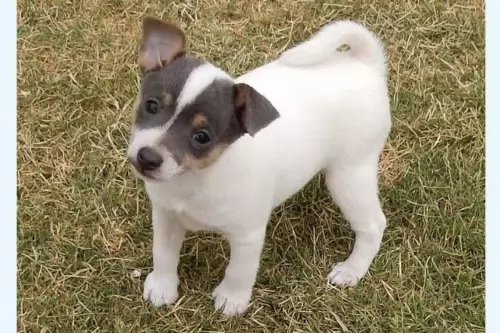 The Tenterfield Terrier is square and compact. He has a head shaped like a wedge and unusual in the terrier group. They have pricked ears and are predominantly white mixed with tan or black. They could also be tri-colored in black/tan and white or tan/liver and white. They have naturally occurring bob tails or docked tails. The nose is usually black unless the dog is liver colored, they have liver noses. The jaws are strong, and lips are tight with a strong neck.
The Tenterfield Terrier is square and compact. He has a head shaped like a wedge and unusual in the terrier group. They have pricked ears and are predominantly white mixed with tan or black. They could also be tri-colored in black/tan and white or tan/liver and white. They have naturally occurring bob tails or docked tails. The nose is usually black unless the dog is liver colored, they have liver noses. The jaws are strong, and lips are tight with a strong neck.
 1.Children friendliness yes Teddy's love to play and enjoy children. Enjoys spending time with family and interacting with their human family taking part in the everyday routines.
1.Children friendliness yes Teddy's love to play and enjoy children. Enjoys spending time with family and interacting with their human family taking part in the everyday routines.
2.Special talents The breed has high prey drive and an very intense sense of smell One of their talents is to be trained to find, by scent, Black Truffles (a type of edible mushroom) found close to the roots of some trees in the Western half of North America.
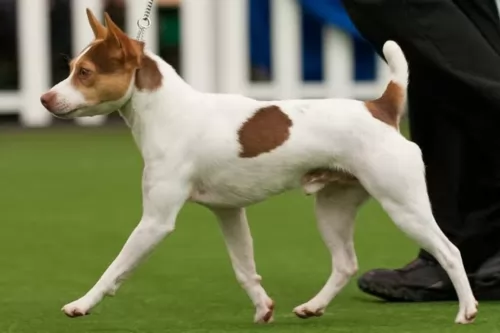 3.Adaptability – they need space even though they are small. They need a lot of exercise. They can adapt if they get another exercise. They can live in apartments and can play indoors as well as out.
3.Adaptability – they need space even though they are small. They need a lot of exercise. They can adapt if they get another exercise. They can live in apartments and can play indoors as well as out.
4.Learning ability – They are extremely intelligent, but they can be stubborn like all terriers.
 • Ectopia lentis a congenital problem where the lens of the eye is displaced. Eye disease
• Ectopia lentis a congenital problem where the lens of the eye is displaced. Eye disease
• bite problems (malocclusions -teeth that are incorrectly aligned when jaw is closed.),
• Hip dysplasia, elbow dysplasia, (hip or elbow socket that does not fully cover the ball which increases the risk of displacement.
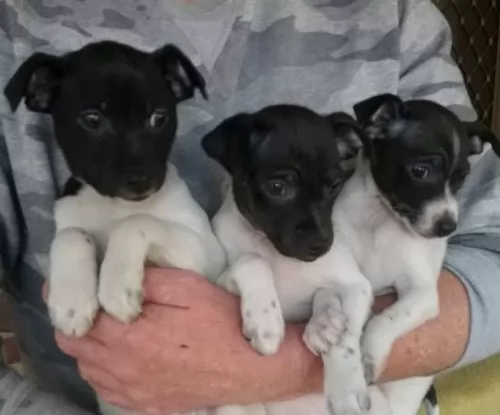 They are small in stature and because of their face they seem to have dental issues. The breed does not have a lot of health issues but deals with the same issues as many small terriers. Not all members of the breed are susceptible to these, but some are just like the Australian Terrier.
They are small in stature and because of their face they seem to have dental issues. The breed does not have a lot of health issues but deals with the same issues as many small terriers. Not all members of the breed are susceptible to these, but some are just like the Australian Terrier.
 1 Feeding the puppy Puppies should eat a minimum of a cup and max of a cup and three quarters each day. 1-13/4
1 Feeding the puppy Puppies should eat a minimum of a cup and max of a cup and three quarters each day. 1-13/4
2.Feeding the adult Adult Teddy Roosevelt Terriers should eat three-fourth to one-and-a-half cups per day.
3.Points for Good Health - fairly healthy The Teddy Roosevelt Terriers displays some common joint issues that are shared by Rat Terriers.
4. Games and Exercises Having descended from hunting/working dogs Teddy Roosevelt's are able to learn and work conformation rings, and agility trials. They like to play and take part in swims, hikes and playing fetch or Frisbee. They take well to obedience training.
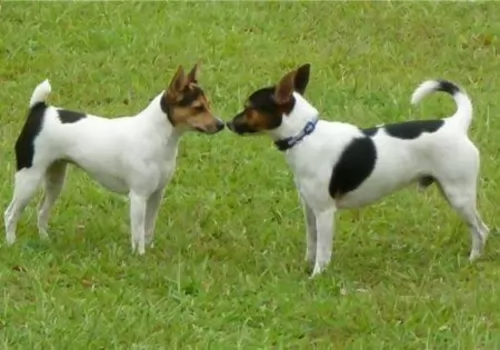 1.Feeding the puppy – Don’t overfeed but do feed high quality puppy food for small breeds and terriers.
1.Feeding the puppy – Don’t overfeed but do feed high quality puppy food for small breeds and terriers.
2.Feeding the adult – This is an active breed but don’t overfeed. Feed a high quality adult dog food for terriers or small breeds. Feed 2 times a day.
4. Games and Exercises – The breed has a high energy level and needs a lot of exercise. He is a terrier and loves to “go to ground”. Play activities that allow him to do that are best. He plays barn hunt, lure coursing and terrier specific competitions.